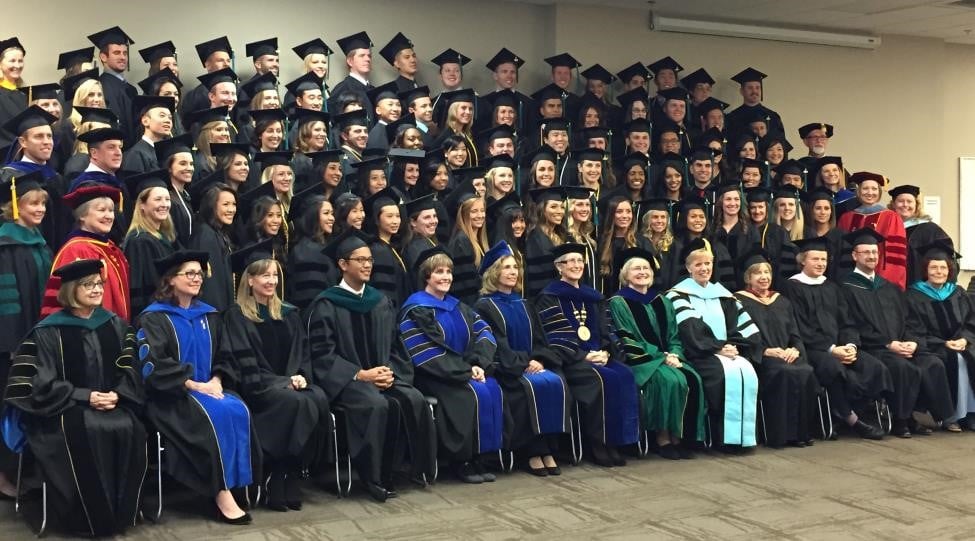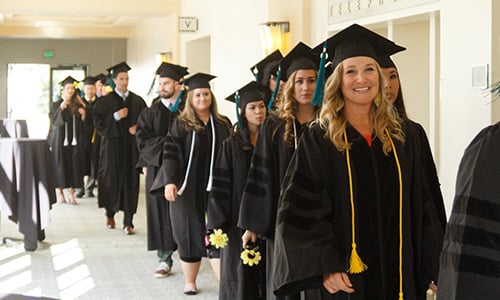
Katie Hohman
Advocacy is about taking action and garnering support to bring change or awareness to a cause or issue. Through small but significant steps, such as writing letters, mentoring or speaking publicly, advocacy can occur in many impactful ways. Regardless of the chosen path, anyone can become an advocate with the goal to make things better—whether it’s by influencing and guiding healthcare policies, being involved in a professional association or through volunteerism and community service.
Take it from Katie Hohman, PT (tDPT ’10). She has owned and operated a private physical therapy practice since 2009. Dr. Hohman is an active member of the American Physical Therapy Association (APTA) and sits on the University of St. Augustine for Health Sciences (USAHS) Alumni Association Advocacy Committee.
Dr. Hohman signed up to be a key APTA contact for her district in Florida four years ago. One year later she was in Washington, D.C., talking to senators and representatives on Capitol Hill about issues that matter to her constituents. She shares her thoughts about how to have your voice be heard on issues that are important in the health sciences professions.
“The best first steps are supporting the Alumni Association’s efforts and becoming a member of your discipline’s association or society. For example, APTA provides excellent templates and contact information to help its members reach out to local legislators on issues that PTs are facing. I urge you to contact your local legislators for a sit-down meeting, so they can put a face with the issues that matter to your discipline,” she says.
“As advocates for one of the most phenomenal professions in the world, it is our obligation to educate as much as we can (in whatever way we can) to enhance patient and community awareness. This can be through social media platforms, a company website, blogs/articles and good ol’ fashioned face-to-face interaction.”


Rebekah Jarrar, OTD, MA, MOT, OTR/L (MOT ’17, OTD ’ 23), who serves the Advocacy Committee as its vice president and chair, is an active member of her local community and a passionate advocate for children and their families. Dr. Jarrar has some encouraging words of advice for alumni wanting to become involved:
“No step is too small in terms of advocacy.”
Dr. Jarrar recommends reaching out via USAHS alumni social media or directly to the Advocacy Committee, which regularly reports on issues needing immediate attention.
“We are currently monitoring an urgent action alert put out by AOTA (American Occupational Therapy Association) to ask Congress to prevent Medicare cuts to occupational therapy,” she says. The call-to-action link is www.votervoice.net/AOTA/ Campaigns/109385/Respond.
She also recommends keeping membership to professional national and state organizations active. “Each organization fights on our behalf and has opportunities to volunteer, sign letters of support and read about current legislation affecting our practice areas. As an alumni group of 15,000 strong, we have a huge opportunity to amplify the voices of both the University and our individual practice areas by standing together behind crucial legislation,” Dr. Jarrar states.


Rebekah Jarrar and Derrick Campbell
Advocating for change by championing legislation, USAHS Director of Physical Therapy Clinical Education Coordination Derrick F. Campbell, PT, DPT, DSc wants to ensure healthcare professionals have adequate training for awareness and intervention in situations involving human trafficking. As the Texas Capital Area District Delegate for supporting adoption of RC-6-23 SUPPORT FOR EDUCATION THAT INCLUDED IDENTIFYING SIGNS OF HUMAN TRAFFICKING, he has continued efforts to advocate for populations marginalized by this crime. Dr. Campbell was the motion developer and delivered the support statement to the floor of the APTA House of Delegates this past summer in Washington, D.C.
“Advocacy is encouraged in states where such training is not mandated by reaching out to state boards,” says Dr. Campbell. “This proactive approach empowers healthcare providers to support and intervene for victims of human trafficking effectively.”
The range of advocacy interests and topics concerning healthcare professionals is broad, and experiences are diverse.
“Your experience and passion are encouraged,” says Dr. Jarrar. “When many people work together, there’s more hope for a brighter future for our profession and our patients.”


Advocacy committee monitors pertinent healthcare issues
The Alumni Association Advisory Board’s Advocacy Committee regularly monitors pertinent issues affecting health sciences as well as actions of 10 organizations to stay abreast of the work being done in both the community and legislative arenas. The committee’s report also includes a list of action items that need engagement from alumni and the USAHS community. Together, USAHS alumni can advance issues that matter. Your profession needs you! To get started:
- Support the USAHS Alumni Association by being an active member.
- Join your professional society or association.
- Stay up to date by reading the Advocacy Committee recaps on the usa.edu alumni pages.
- Raise your hand to volunteer or put your name on the sign-up sheet when it’s passed around.








